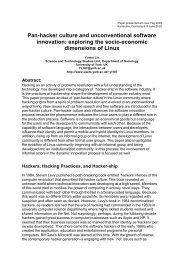Create successful ePaper yourself
Turn your PDF publications into a flip-book with our unique Google optimized e-Paper software.
Third, the buffer cache and the interface to disk drivers support the use of a single buffer object to refer to as much<br />
as an entire disk extent, even if the extent is very large and the buffered pages in memory are not contiguous. This<br />
is important <strong>for</strong> high per<strong>for</strong>mance, since allocating, initializing, and processing a control block <strong>for</strong> each disk block<br />
in, <strong>for</strong> example, a 7 MB HDTV video frame, would represent a large amount of processor overhead, particularly<br />
when one considers the cost of cache misses on modern processors. <strong>XFS</strong> has been able to deliver 7 GB/second<br />
from a single file on an SGI Origin 2000 system, so the overhead of processing millions of control blocks per<br />
second is of practical significance.<br />
Fourth, the buffer cache supports "pinning" buffered storage in memory, which means that the affected buffers<br />
will not be written to disk until they have been "unpinned". <strong>XFS</strong> uses a write-ahead log protocol <strong>for</strong> metadata<br />
writes, which means <strong>XFS</strong> writes a log entry containing the desired after-image be<strong>for</strong>e updating the actual on disk<br />
metadata. On recovery, <strong>XFS</strong> just applies after-images from the log (in case some of the metadata writes were not<br />
completed). In order to avoid having to <strong>for</strong>ce the log be<strong>for</strong>e updating metadata, <strong>XFS</strong> "pins" modified metadata<br />
pages in memory. Such pages must count against the memory reservation (just as do delayed allocation pages).<br />
<strong>XFS</strong> pins a metadata page be<strong>for</strong>e updating it, logs the updates, and then unpins the page when the relevant log<br />
entries have been written to disk. Since the log is usually written lazily, this in effect provides group commit of<br />
metadata updates.<br />
The pagebuf Module<br />
Our approach to porting <strong>XFS</strong> has included adding pagebuf, a layered buffer cache module on top of the <strong>Linux</strong><br />
page cache. This allows <strong>XFS</strong> to act on extent-sized aggregates. Key to this approach is the pagebuf structure,<br />
which is the major structure of the pagebuf layer. The pagebuf objects implemented by this module include a list<br />
of physical pages associated with the pagebuf, plus the device in<strong>for</strong>mation needed to per<strong>for</strong>m I/O.<br />
In earlier versions of <strong>XFS</strong> <strong>for</strong> <strong>Linux</strong> we were experimenting with a new device request interface, so that we can<br />
queue one of these pagebuf objects directly to a device, rather than having to create and queue a large number<br />
of single-block buffer_head objects <strong>for</strong> each logical I/O request. These extensions have been superceeded by<br />
the <strong>Linux</strong> 2.5 block layer rewrite that allows the submission of multi-page bio requests; current <strong>XFS</strong> versions <strong>for</strong><br />
<strong>Linux</strong> 2.4 create and queue buffer_head objects to per<strong>for</strong>m pagebuf I/O.<br />
A key goal <strong>for</strong> the layered buffer cache module is that its objects be strictly temporary, so that they are discarded<br />
when released by the file system, with all persistent data held purely in the page cache. This avoids creating<br />
yet another class of permanent system object, with separate locking and resource management issues. The IRIX<br />
buffer cache implementation has about 11000 lines of very complex code. By relying purely on the page cache <strong>for</strong><br />
buffering, we avoid most of the complexity, particularly in regard to locking and resource management, of hybrid<br />
page and buffer caches, at the cost of having to pay careful attention to efficient algorithms <strong>for</strong> assembling large<br />
buffers from pages.<br />
Delayed Allocation of Disk Space <strong>for</strong> Cached Writes<br />
Allocating space when appending to a file slows down writes, since reliable metadata updates (to record extent<br />
allocations) result in extra writes. Also, incremental allocations can produce too-small extents, if new extents are<br />
allocated each time a small amount of data is appended to a file (as when many processes append to a log file).<br />
Delayed allocation reserves disk space <strong>for</strong> a write but does not allocate any particular space; it simply buffers the<br />
write in the page cache. Later, when pages are flushed to disk, the page writing path must ask the file system to<br />
do the actual allocation. Also, to allow <strong>for</strong> optimal extent allocations and optimal write per<strong>for</strong>mance, the page<br />
writing path must collect adjacent dirty pages ("cluster" them) and write them as a unit.<br />
Since allocation of disk space may be required in the page writing path when delayed allocation is present, and<br />
such allocation may require the use of temporary storage <strong>for</strong> metadata I/O operations, some provision must be<br />
made to avoid memory deadlocks. The delayed allocation path <strong>for</strong> writes must make use of a main memory<br />
reservation system, which will limit the aggregate amount of memory used <strong>for</strong> dirty pages <strong>for</strong> which disk space<br />
has not been allocated, so that there will always be some minimum amount of space free to allow allocations to<br />
proceed. Any other non-preemptible memory allocations, such as kernel working storage pages, must be counted<br />
against the reservation limit, so that the remaining memory is genuinely available.<br />
File I/O<br />
5













